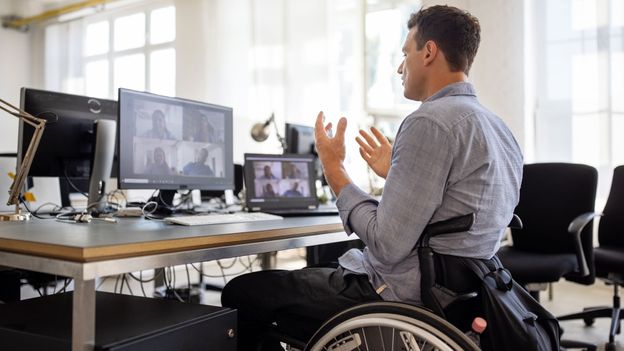
There’s no easy way around that – in Dhawan’s view, we have to accept that video calls will involve a certain a
wkwardness. But she has many suggestions to improve the experience and enable easier turn-taking. In group calls, people could be asked to raise their hands before speaking, for example. It can also be useful to designate a moderator for the call, who can ensure people stick to an agenda and don’t get distracted.
As you might expect, Dhawan strongly advises against multitasking during these calls or allowing yourself to be distracted by other devices. “It is so obvious if you are busy looking down at your phone, when others are trying to make video eye contact with you,” she says. You may think no one will notice, but it signals a lack of engagement and enthusiasm. And if you know that there might be an interruption – such as another incoming call – it’s worth warning people in advance, she says, or at least putting a message in the chat box to explain why you have left, just to emphasise your respect for the people who are left in the meeting.
Trust and power
Whatever medium you use, Dhawan argues that you should remain conscious of two factors – trust and power – in all your interactions. These ratings will be subjective, of course, but if you sense there is a clear gap on either of these dimensions, you need to be more cautious.
This principle applies to people at the top of the hierarchy, as well as those on the first rungs of the career ladder. An intern should be highly sensitive to their boss’s communication style to be sure they don’t slip into an inappropriately informal manner, but – equally importantly – a manager might consider whether their brevity is simply seen as a sign of efficiency, or whether it shows a general lack of interest in their employee’s wellbeing. Two colleagues who have worked together frequently could perhaps afford to be more relaxed in their digital body language – with more informal messages – but even then, you might regularly question whether you are really coming across the way you think.
Generally, we, should be especially careful to express our appreciation. “In the past, the handshake, the smile and the smile gave us those signals,” says Dhawan – but in online communication, our gratitude is often less apparent, or may not be expressed at all. Measures to remedy this could be as simple as sending a follow-up email, after a virtual meeting, to make it clear that you valued someone’s input, or cc’ing a junior colleague on an email to a client, acknowledging the role they played in a project. We can’t just assume that our colleagues will know how much we value them.
Like any skill, perfecting your digital body language will take practice – but a few moments of thought each day may save hours of anxiety and confusion in the days and weeks ahead.
Erica Dhawan’s book Digital Body Language, is out now from St Martin’s Press.
David Robson is the is author of The Intelligence Trap: Revolutionise Your Thinking and Make Wiser Decisions (Hodder & Stoughton/WW Norton) – out now in paperback. He is @d_a_robson on Twitter.
The Link LonkJune 17, 2021 at 02:00PM
https://www.bbc.com/worklife/article/20210617-the-digital-body-language-cues-you-send-or-dont-send
The digital body language cues you send – or don't send - BBC News
https://news.google.com/search?q=Send&hl=en-US&gl=US&ceid=US:en

No comments:
Post a Comment